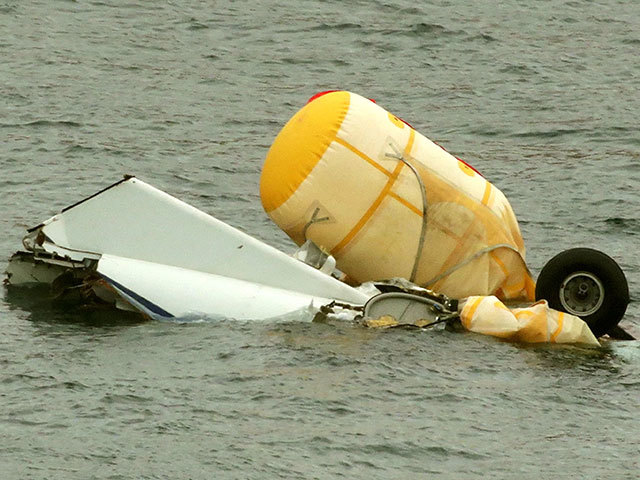
Survivors of the 2013 Super Puma crash which killed four oil workers have launched a damages claim worth more than £5million.
Nine passengers who were on the aircraft when it went down off the coast of Shetland are taking legal action against CHC Helicopter claiming their lives have been “destroyed” by the accident.
Four of their colleagues were killed when the AS332 L2 – operated on behalf of offshore giant Total – plunged into the North Sea about two miles west of Sumburgh Airport.
Lawyers for the group of survivors said their claim was being raised for the physical, emotional and financial losses suffered by the workers.
CHC Helicopter said last night it “deeply regretted” the loss of life and that it had paid out more than £500,000 in interim insurance payment to those affected by the crash.
A spokeswoman added: “Throughout the period of investigation, there has been much work undertaken to provide financial assistance to the families impacted by the accident.”
The survivors seeking damages claim they suffered a range of injuries, from a fractured spine to the effects of swallowing aviation fuel which leaked from aircraft.
One said he suffers flashbacks to the tragedy and had been diagnosed with post-traumatic stress disorder.
Lisa Gregory, partner at legal firm Digby Brown in Aberdeen, who is representing the group, said: “It has been the most horrific experience and we can’t imagine how it is going to affect them for the rest of their lives.
“For justice to be done, they have to be compensated for all of the emotional, physical and financial losses they have suffered.
“These men were just going to work when their lives and the lives of their families were destroyed by this crash.”
Mrs Gregory said the crash had impacted heavily on the lives of her clients, and claimed they had all been diagnosed with various forms of psychological trauma.
She said: “Anybody involved in this sort of incident can develop long-term psychological trauma which can affect the types of job they can do in the future.
“Talking generally, being involved in this type of incident is bound to have an effect on day-to-day activities and relationships. That is the very nature of psychological trauma.”
CHC Helicopter will now have to indicate whether it intends to the defend the claim.
The Super Puma had 18 people on board when it crashed on August 23, 2013.
Those who died were Sarah Darnley, 45, from Elgin; Gary McCrossan, 59, from Inverness; George Allison, 57, from Winchester; and Duncan Munro, 46, from Bishop Auckland.
Initial findings by the Air Accidents Investigation Branch (AAIB) revealed human error may have caused the crash, as neither the pilot nor co-pilot noticed a significant drop in speed as the helicopter approached Sumburgh Airport.
The AAIB has yet to report its full conclusions.
Meanwhile, separate insurance claims have been lodged against CHC by the workers.
CHC Helicopter said it “deeply regretted the loss of life” and has made interim payments of more than £500,000 to the families affected by the accident.
The company said a large number of insurance claims had been resolved but that it had not received all medical reports required.
A spokeswoman for CHC said: “Throughout the period of investigation, there has been much work undertaken to provide financial assistance to the families impacted by the accident.
“For those that have brought claims, the process of assessing and quantifying them has been a difficult one for all involved, but considerable progress has been made and a large number of claims have already been resolved.
“Regrettably, a few claims remain unresolved as the insurer awaits the results of professional assessments, such as medical exams.
“Whilst this is disappointing, CHC and its insurers are keen to receive these assessments so the process can move forward and these few outstanding claims can be resolved.
“In the meantime, a significant sum of money – now in excess of £500,000 – has already been paid on an interim basis and to alleviate any potential hardship.
“It is the company’s sincere desire to resolve the remaining outstanding claims as quickly as possible.”
Mrs Gregory said some claims had been difficult to assess and quantify but there had been no delay in getting medical reports.
She added: “We have to give the clients time to have their treatment and recuperate fully, or at least as best they can.
“No one can dictate how long that process might take. Until then, many of them are totally dependant upon the financial support they have had from CHC.
“Without that support, they are left unable to support themselves and the financial pressures and hardship only serve to add to the trauma and the anxiety.”
One survivor, who lives in Glasgow, said “I’ve been off 22 months with chronic post-traumatic stress disorder – I keep having flashbacks.
“There’s no procedure in place for the after care of the survivors.
“I’m three weeks behind on my rent. We’re in the red every month. My credit rating is ruined.
“They have to put in place a procedure so the next people to find themselves in this situation are not struggling like we are.”
Recommended for you
